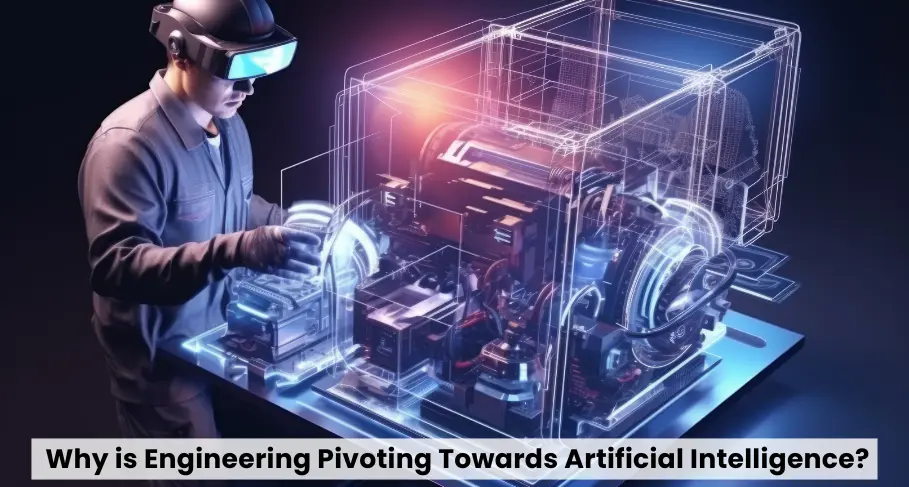Engineering graduates have been the backbone of India’s industrial growth for decades. However, the landscape is undergoing a significant shift. The emergence of Artificial Intelligence (AI), Machine Learning (ML), and Robotics is rapidly transforming the engineering field, ushering in the era of the “AI Engineer.”
The obsession with engineering degrees in India can be traced back to the economic turmoil of the 1970s. With limited job opportunities across sectors, engineering offered a secure career path. This trend continued even after the economic liberalization of the 1990s, as new industries like IT and telecom boomed.
Cut to the 21st century, and AI has propelled engineering back to the forefront of innovation. The breakneck advancements have created a surging demand for computer science graduates. AI-powered engineers are pioneers of proactive solutions. When equipped with strategic thinking, they hold the ability to anticipate intricate challenges, and they craft immediate, ingenious resolutions. These solutions illuminate issues that lay dormant and imperceptible. AI engineers are not merely reactive problem-solvers but prescient guardians, proactively safeguarding our future by tackling problems before they materialize.
This shift towards AI isn’t just about job security. These technologies are fundamentally changing how engineering problems are approached. AI and Machine Learning can analyze vast amounts of data to identify patterns and optimize designs. Robotics automates repetitive tasks, freeing up engineers to focus on higher-level problem-solving and innovation.
Indian Engineering Landscape
The Indian engineering landscape is witnessing a fascinating trend. While the demand for engineers with expertise in Artificial Intelligence is skyrocketing, there’s a corresponding surge in the number of students choosing Computer Science Engineering (CSE). Reports like The Engineering Outlook Report 2024, By shiksha.com reveal that a significant 33% of engineering aspirants across India are opting for CSE programs. This trend aligns perfectly with the growing industry needs, as highlighted by The India Skills Report 2024, Wheebox. This report indicates that computer science graduates are the second most employable workforce, with a staggering 66% of them possessing highly sought-after skills in this domain. In essence, the increasing demand for AI engineers is being met with a growing pool of skilled computer science graduates, indicating a positive shift in the educational landscape to cater to the future of engineering.
The AI Spin To Conventional Engineering Disciplines
The rise of AI has undoubtedly created exciting new opportunities for engineers. However, this shift isn’t without its challenges. The gradual yet radical shift seems to bother many. Academicians from leading engineering colleges have openly expressed their concern on the challenges they face to fill B.Tech seats for other engineering streams. V Ramgopal Rao, vice-chancellor of BITS Pilani group and former director of IIT Delhi, says, “Colleges have a tough time filling even one-third of the available seats in branches other than Computer Science (CSE) and IT. Students are often averse to joining any of the traditional disciplines such as Civil, Mechanical, Materials Science, Metallurgy and Electrical Engineering. Several colleges are often left wondering what to do with the quality faculty and infrastructure created in these core areas.” states Rajlakshmi Ghosh in Lure of global jobs offering attractive salaries fuel Computer Science craze (Education Times, Feb 2024)
This highlights the need for universities offering B.Tech programs to adapt. By integrating AI/ML concepts into these core branches, they can demonstrate how these foundational skills will continue to be crucial in the future. Imagine a civil engineer using AI-powered software to design a self-optimizing transportation network – their understanding of structural analysis and design principles will be essential for interpreting the software’s recommendations and ensuring the project’s success. A mechanical engineer could leverage Machine Learning to optimize the performance of a new engine design. These are just a couple of examples of how AI transforms engineering practices across various industries. The future of engineering likely requires a combination of both AI expertise and strong foundational skills in core engineering disciplines.

Dr. Kiran Ravulakollu
Dean – School of Technology, Woxsen University
“The entire world is moving towards automation. I believe the key to staying ahead lies in intelligent automation powered by Artificial Intelligence (AI). The previous century witnessed mechanical automation at the core but that’s not the case anymore. Industries that embrace this new wave of intelligent automation will thrive, while those that don’t will struggle. AI is not a choice, it’s the inevitable future. We, as a nation, need to adapt to AI to stay competitive…
…That’s why at Woxsen, we’ve already begun our journey ahead of time with AI. We’re not just focused on the present, we’re looking towards the future, supporting the entire global industry of technology. At the core of AI is computer science, the software that gives AI its perceptive abilities. AI itself will be the driving force behind intelligent automation, constantly improving and optimizing the process. And don’t forget data science, the fuel that powers all this technology. Finally, with great technological power comes great responsibility, which is why cybersecurity is crucial to safeguarding everything we’re building.”- Dr. Kiran Ravulakollu, Dean School of Technology, Woxsen University, Hyderabad.
Additionally, as we move towards a more sustainable and greener world the role of AI cannot be undermined. Computer science engineers will be able to effectively optimize green technologies like renewable energy systems and develop AI models to predict demand. They can also design AI-powered systems that analyze climate change and pollution levels.
Demand Spike in The Job Market
In an analysis stated on IMF Blog in January 2024, about 60 percent of jobs may be impacted by AI in advanced economies. The demand for engineers with AI/ML skills is on the rise. A report by Burning Glass Technologies (2022) states a staggering 4.5x growth in job postings requiring AI-based skill sets. This highlights the need for educational institutions to address the integration of AI/ML modules into their curriculums. Additionally, online courses, boot camps, and professional certifications offer valuable upskilling opportunities for existing engineers.
The mechanical revolution birthed innovation, and the industrial revolution harnessed its power to solve its problems. Today, the AI revolution isn’t just changing the technical landscape; it’s breaking the boundaries of the possible. AI is revolutionizing the technical landscape, redefining the world for possibilities never imagined and challenges never seen. While computer science students flock to AI’s potential, the true revolution lies in its integration with ALL engineering disciplines. This isn’t just about keeping pace; it’s about leveraging AI to become prescient, anticipating challenges before they arise. It’s about surpassing not just our contemporaries but the very limitations of the present. The future isn’t a spectator sport; it’s a canvas waiting for our brushstrokes. We must be the Einsteins and Curies of this era, wielding AI as our chisel to sculpt a future full of unimaginable possibilities.


